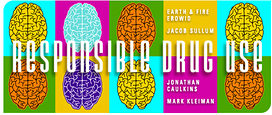First, let me say that I appreciate the (sadly rare) opportunity to debate drug policy with well-informed, intellectually honest people who do not take for granted the correctness of the categories laid out in the Controlled Substances Act. I think all of us agree that many aspects of the war on drugs are counterproductive, if not downright cruel, and that much of what the government says about illegal intoxicants is not true.
I guess I disagree with both Jonathan Caulkins and Mark Kleiman about how big a deal it is to dictate which substances people may introduce into their bodies. Since I start from the premise that self-ownership is the source of all rights, the attempt to regulate the contents of people’s bloodstreams (and, indirectly, the contents of their minds) seems like a fundamental violation of liberty to me. In my view, this sort of restriction would be justified only in the most extreme cases, involving violations of other people’s rights. If a particular drug consistently drove people to violence, for example, prohibiting consumption of that drug might be justified, since consuming it would be tantamount to an act of aggression. More generally, if psychoactive substances really were the magical potions they are reputed to be, causing people to do evil without regard to their own values, intentions, and choices, prohibition would make a lot more sense, although I suspect it would hardly be necessary, since few people would want to surrender their wills in this way.
While Mark recognizes the important role psychedelics can play in people’s lives, I fear he is too ready to judge the value of other people’s drug use and deny them the freedom to consume psychoactive substances when the benefit does not rise above “mere pleasure.” I don’t know about you, but I like pleasure. I see nothing wrong with taking LSD simply because it’s fun, even if no revelations are forthcoming. Likewise snorting cocaine at a party, taking MDMA at a rave, or smoking pot to enhance the enjoyment of music or a good meal. I will go out on a limb and say that if people can get pleasure without hurting themselves or anyone else, that’s a good thing.
Even if I’m puzzled by the ways other people get pleasure, I would not presume to forcibly stop them except in defense of myself or others. The state should be governed by the same principle.
Mark puts alcohol (cardiovascular benefits aside) in the category of merely fun drugs. Although I’m not sure I’ve ever really “learned” anything from alcoholic beverages (except, perhaps, when to stop drinking), they enhance my life in many ways. I resent the idea that I should be prohibited from consuming them simply because other people use them to excess. Most Americans feel the same way about this particular variety of the addict’s veto. But they do not see the war on drugs as analogous to alcohol prohibition, because they believe the currently illegal intoxicants are intrinsically different from alcohol in a way that makes it impossible to use them responsibly. By contrast, the participants in this discussion recognize that virtually all of the problems associated with illegal drugs are also associated with alcohol, usually to a greater degree. Despite that fact, I would not support a ban on alcohol, which I see as unjustified in principle and apt to cause more harm than it prevents.
I don’t think Mark or Jonathan wants to bring back alcohol prohibition either, but I’m curious about their reasoning. How important is the lack of majority support for such a policy? Do Mark and Jonathan oppose alcohol prohibition simply because they believe the costs would outweigh the benefits? And why does the cost-benefit analysis come out differently in the case of alcohol than it does in the case of cocaine, heroin, or methamphetamine? Does the moderate drinker (or the alcoholic, for that matter) have a valid moral objection to prohibition?

